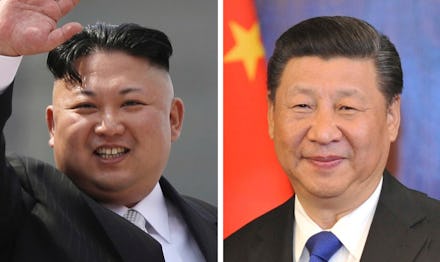Kim’s meetings with Xi Jinping underscore China’s sway over potential North Korean denuclearization

Kim Jong Un this week met for the third time in as many months with Chinese President Xi Jinping — a sign of increasing cooperation between Beijing and Pyongyang, and a reminder of China’s influence on the future of North Korea’s nuclear program.
In an unannounced two-day meeting in Beijing Tuesday and Wednesday, Kim and Xi discussed “strategic and tactical” cooperation between the countries, according to North Korean state media.
“I have faith that, with the joint efforts of China and North Korea, our relationship can definitely benefit both countries and both peoples,” Xi said, according to Chinese state media.
The meetings came as the U.S. and China appeared to be hurtling toward an all-out trade war — and a week after President Donald Trump’s historic Singapore summit with Kim, which the North Korean leader already appears to be reaping the benefits of.
Trump lavished praise on Kim, which critics said downplayed the dictator’s poor human rights record and lent him undeserved legitimacy on the world stage. He also agreed to cease America’s joint military exercises with South Korea in a major concession to Kim.
Kim didn’t appear to give up much in exchange, agreeing to “work toward complete denuclearization of the Korean Peninsula” but apparently without any concrete details about how he will do so.
Still, Kim’s meeting with Trump will likely be enough to convince China — North Korea’s biggest trading partner by far — to ease sanctions against Pyongyang, something experts say would be a big win for the North Korean leader.
“It’s very important to North Korea to have repaired relations with China,” Jenny Town, a research Analyst at the Stimson Center and managing editor of the North Korea policy analysis site 38 North, told Mic. “It creates both a hedge against relations with the U.S. going sour, and opens doors to economic activity back up.”
That all gives China significant leverage over the situation in the region; as the Washington Post’s Amanda Erickson observed Thursday, “no long-term agreement on North Korea’s nuclear weapons will be achieved without buy-in from both Xi and Kim” — despite Trump’s public insistence that he has already solved North Korea’s nuclear threat.
“There is no longer a Nuclear Threat from North Korea,” Trump tweeted after the summit June 13. “North Korea has great potential for the future!”
But that future will be significantly influenced by China, which appeared to suggest to Trump this week that his new tariffs against Beijing could undermine U.S. goals on the Korean peninsula.
“[Kim’s] visit to Beijing shows that North Korea and China are in close coordination,” Naoko Aoki, a research associate at the Center for International and Security Studies at University of Maryland, told Mic. “It has a symbolic element, too, as it shows that China has influence over developments in the region.”
That appears to be reflected even in the vague deal Trump and Kim signed June 12; in suspending what he called “war games,” Trump agreed to something that looked an awful lot like the “freeze-for-freeze” proposal China has been pushing — and the U.S. has consistently dismissed.
That China will play a major role in the future of the peninsula is about the only certainty in the wake of the Singapore summit.
Kim agreed to work toward a “lasting and stable peace” with Trump, who has said he will invite the North Korean leader to the White House, but it isn’t clear if North Korea is really serious about denuclearizing.
And while Trump continues to celebrate that North Korea has “stopped everything you’d want them to stop,” Kim has not apparently taken such concrete steps to do so — and much will likely depend on negotiations going forward.
“It depends on if we’re able to have a successful diplomatic path forward,” Stephen Miles, director of Win Without War, a progressive foreign policy advocacy organization, told Mic. “We’re only at the beginning of that process.”